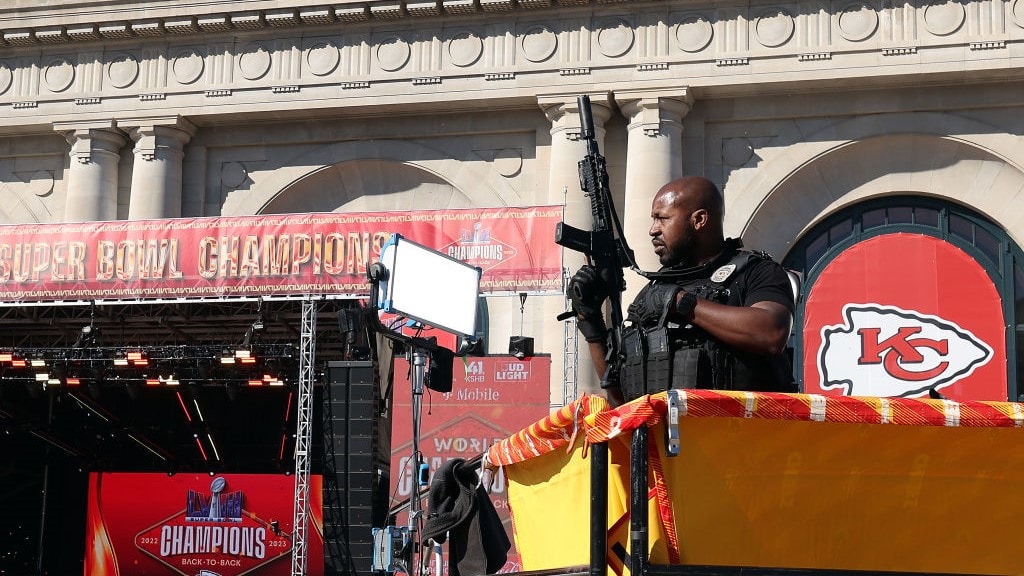Seeking Help for Children Traumatized Mass Shooting in Kansas City? Experts Stress Routines Schools canceled classes for what was supposed to be a joyful event. But after the Chiefs parade ended in a shooting, educators are making sure students have support and stability.
Published February 16th, 2024 at 12:01 PM
Above image credit: People attend a candlelight vigil for victims of a shooting at a Kansas City Chiefs Super Bowl victory rally on Thursday, Feb. 15, 2024, in Kansas City, Mo. More than 20 people were injured and one woman killed in the shooting near the end of Wednesday's rally held at nearby Union Station. (AP Photo | Charlie Riedel)For starters, experts suggest, get the kids back into school. Routines matter in the raw aftermath of trauma such as the mass shooting at the Kansas City Chiefs Super Bowl parade.
Child health experts say the shooting that killed a mother and wounded several children at the close of Kansas City’s celebration of the Chiefs’ latest Super Bowl championship likely left kids traumatized. Whether they were near Union Station or, for some, just hearing the news.
Schools quickly made social workers and counselors available Thursday and put out advice to parents on how to help children return to a sense of normalcy and safety.
Some children, the experts say, need to talk about their concerns. That, the experts say, needs to be balanced against dwelling too much on what happened or trying to force conversations that could go wrong.
Wednesday’s violence came after clinicians saw a troubling mental health hangover from the pandemic.
“Rates of anxiety and depression doubled for young people,” said Dr. Shayla Sullivant, a child and adolescent psychiatrist with Children’s Mercy Hospital. “Now we have more kids that have experienced trauma.”
Multiple school districts said that they’re turning to what’s familiar — like going right back to school — to help restore calm after a calamity.
When disaster strikes, “it comes from a place that we didn’t expect, and we don’t know how to deal with that,” said David Smith, a spokesperson for the Shawnee Mission School District. “Being able to connect people, kids, to the familiar, to the routine, can be helpful and give them a comfort that the world is returning to the world that they know and (where) they feel safe.”
‘Not One Solution’
Adults matter, too. Parents and teachers, Smith said, need to recognize and seek support for their own distress “in order for us to be there for our kids.”
The shooting marked a “community-level trauma,” said Damon Daniel, president of the Ad Hoc Group Against Crime, even in a city that saw a record 182 homicides last year.
“We live in a city where we’re not strangers to violence,” he said.
His group worked with prosecutors and other organizations to offer counseling on Thursday at the Kansas City United Church of Christ in Brookside. He said it’s time to talk with professionals and not to lean on isolation, substance abuse or more violence to cope.
“It’s a very complex problem. It’s not one solution,” Daniel said. “There’s no silver bullet to this.”
For starters, public places might never feel the same to some people after the Union Station shooting. Chris Williams, a counselor with Heartland Therapy Connection, said teenagers and young adults might be particularly damaged by the trauma.
“There are no public places they can look at and be, like, ‘I’m safe here,’” he said. “More and more children are on guard, looking out.”
He said survivors can experience extreme post-traumatic stress disorder symptoms, such as paranoia or fear of loud noises, and will look to adults for assurance.
“We’re losing that ability to tell them it’s gonna be OK,” Williams said. “There are no safe spaces.”
Kansas City Public Schools Superintendent Jennifer Collier emailed parents urging them to address the trauma directly.
“While our instinct may be to shield them from the harsh realities of the world,” she wrote, “it’s essential to proactively address their concerns, especially with our older students who are more likely to seek information independently.”
The district was still sorting out Thursday how many students were close to the shooting even as it suggested parents limit their children’s exposure to news coverage.
Kansas City, Kansas, Public Schools also enlisted counselors and social workers and told parents that their kids need someone to turn to.
“People deal with pain and tragedy differently,” district spokesperson Edwin Birch said. “The main thing is just being available.”
At Wichita’s USD 259, the largest school district in Kansas, administrators strove to return to the routine.
“Children are pretty quick to move on to the next thing,” said Stephanie Anderson, who works in the district’s counseling services. “They don’t dwell on stuff like this, unless they hear adults dwelling on it.”
That, she said, needs to be paired with candor.
“(Don’t) sugarcoat it or don’t create fear,” Anderson said.
Embracing Routines
She and other experts suggest parents look for routines breaking down in the aftermath of the Super Bowl parade. Is your child having trouble sleeping? Has their appetite dwindled? Are they crankier than usual?
An adult’s ear can prove especially helpful, said Tori Cordiano, a clinical psychologist specializing in children and adolescents at Laurel School’s Center for Research on Girls in Shaker Heights, Ohio.
She said trusted adults — family, mental health professionals, school staff — need to be available. Cordiano said younger children may prefer to process their emotions about the parade shooting through art, and older children will need someone to confide in.
“When they have those places to talk,” Cordiano said, “it can help them cope.”
The more comfortable kids feel to talk, she said, the better to keep them grounded and feeling safe.
“When we shut it down,” she said, “it makes it too big or scary.”
Yet exposure to gun violence leaves some psyches damaged for a lifetime. Starsky Wilson, president of the left-leaning Children’s Defense Fund, said gun violence can heighten children’s risk of abusing drugs and alcohol or weigh them down with depression and anxiety.
“The normalization of gun violence in society can desensitize children to the impact of violence and contribute to a sense of helplessness or resignation about the problem,” he said in an email to The Beacon.
Wilson said, in turn, that can make it harder to feel secure, form relationships or thrive in school.
“When exposed to violence,” he wrote, “school-aged children tend to exhibit lower academic grades and increased absenteeism.”
Maria Benevento, Mili Mansaray and Trace Salzbrenner are reporters with The Beacon, a member of the KC Media Collective, where this story first appeared. This story was compiled by Scott Canon based on staff reporting. Suzanne King contributed.






